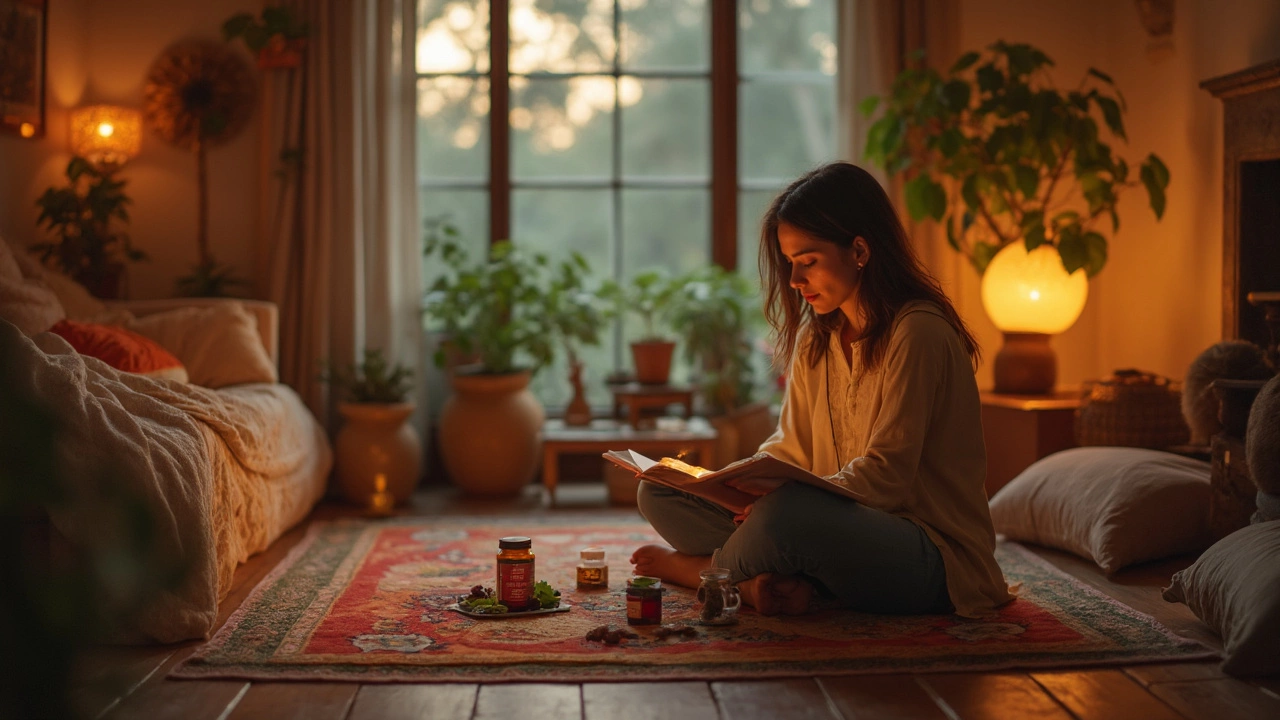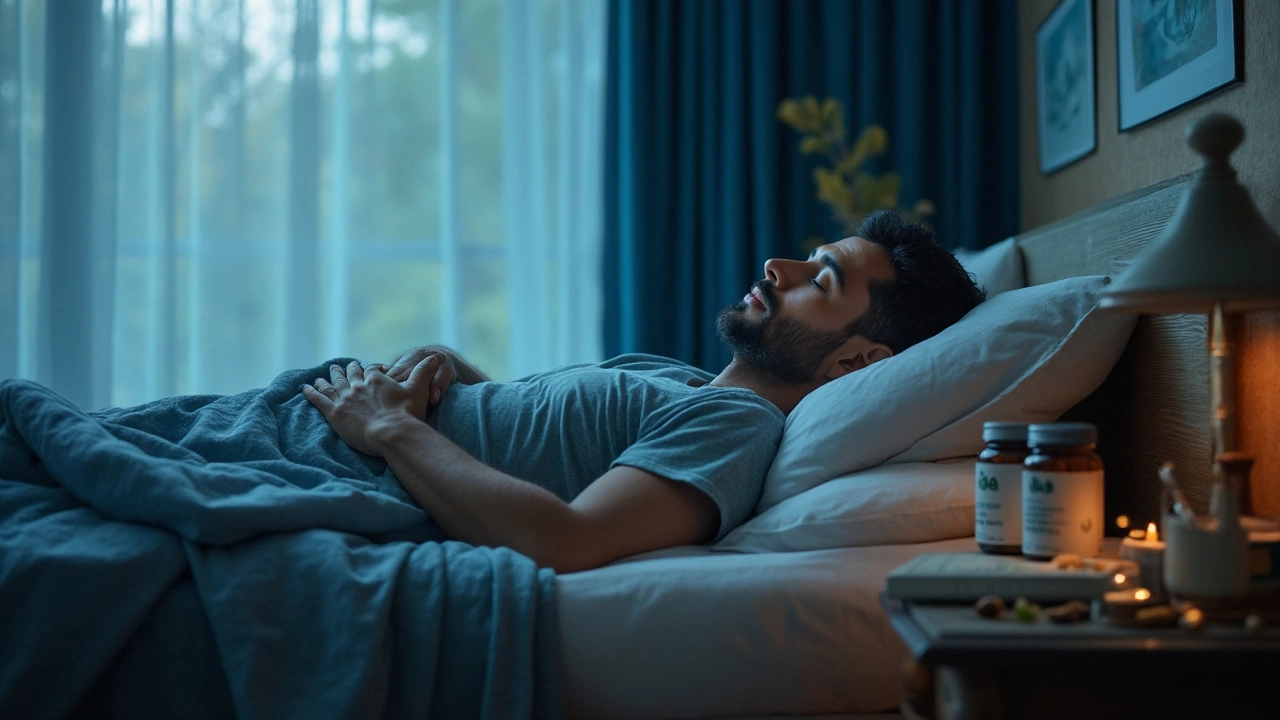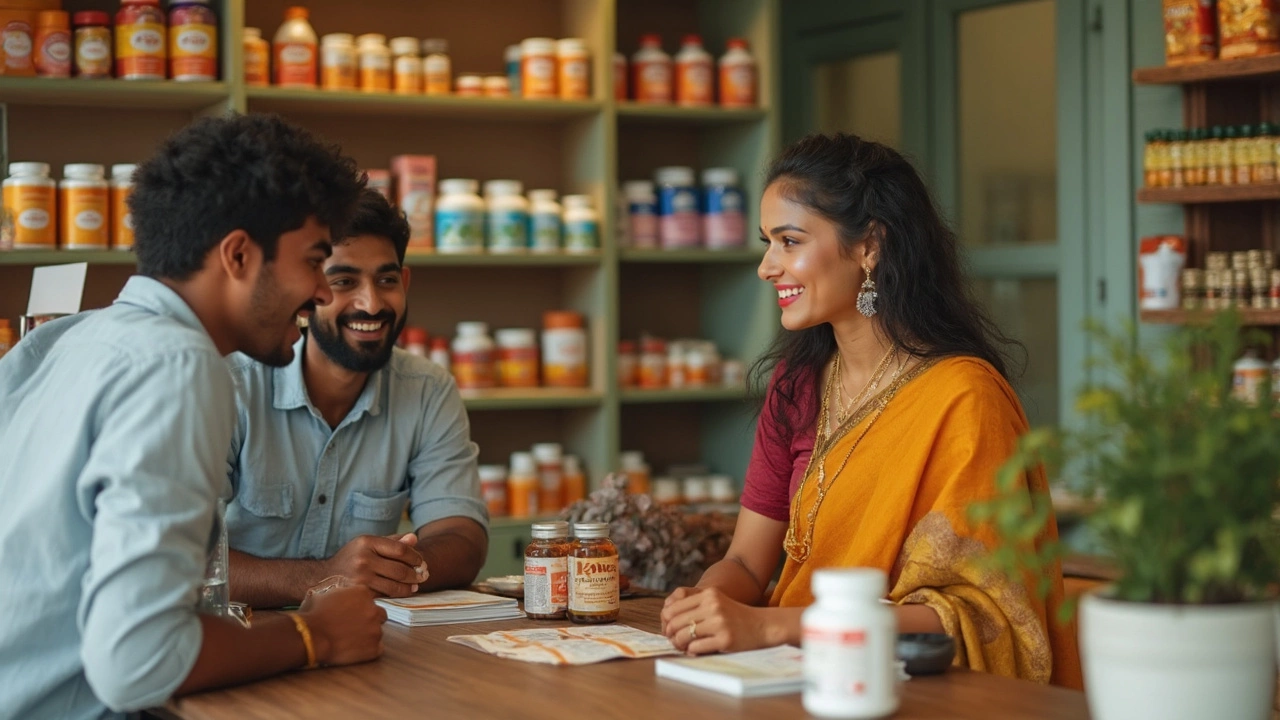
The hunt for something that chills you out like Xanax—without calling a doctor or worrying about addiction—is more common than people admit. Maybe you’re trying to quit prescription pills, maybe you’re just keeping it natural, or maybe you’re looking for quick help with racing thoughts. OTC herbal supplements sound like an easy fix, but which ones work, which ones are hype, and is it actually safe to use them for anxiety?
Lots of folks swear by herbal options to take the edge off anxiety, improve sleep, or melt away stress. But you can walk into any pharmacy or health store and get overwhelmed by shelves of bottles, all promising calm and peace. If you’re stuck figuring out what’s legit, you’re not alone. Turns out, some of these herbs—like valerian root, passionflower, and L-theanine—have been around for centuries, with new research backing up some of what your grandma probably already knew. But ‘natural’ doesn’t always mean safe or effective for everyone.
- Why People Seek Xanax Alternatives
- Popular Herbal Supplements That Calm
- How Safe and Effective Are These Options?
- Smart Tips for Trying Herbal Remedies
- When to See a Professional Instead
Why People Seek Xanax Alternatives
Not everyone wants—or can get—a prescription for Xanax. Lots of people start looking into Xanax alternatives because of side effects, dependency risks, and even the hassle of constant doctor visits. Let’s be real, dependency is no joke: it’s estimated that almost 1 out of 5 people prescribed benzodiazepines (like Xanax) will end up misusing them at some point.
It’s not just about addiction, though. Some folks hit a wall with side effects—like brain fog, dizziness, or just feeling out of it. Others can’t get a script even if they want one. Either their doctor’s wised up, or there are restrictions where they live. That’s where the search for over the counter calming or natural remedies comes in.
The American Psychiatric Association says,
“While prescription anxiety medicines can be effective, people are increasingly interested in herbal remedies and lifestyle changes with fewer risks.”
Here’s what usually pushes people toward herbal anxiety relief and other remedies:
- Worries about becoming dependent or needing higher doses over time
- Bad reactions to meds (think constant drowsiness, headaches, or stomach issues)
- Wanting more control over their own health—not waiting on refills or costly appointments
- Need for something mild, maybe for those "edge" moments, not deep-seated panic attacks
- Curiosity about ancient or natural solutions (because sometimes grandma’s chamomile tea just feels safer)
Surprisingly, a recent 2023 consumer survey found that 58% of people who try herbal supplements for anxiety do it because they “don’t trust pharmaceuticals.” Only 21% do it strictly because of cost.
If you’ve ever paused before popping a prescription pill, you’re not alone. There's a real need for alternatives. It makes sense to want relief that feels safe, easy to buy, and gentle on your day-to-day life.
Popular Herbal Supplements That Calm
If you browse the supplement aisle hunting for something that works like Xanax alternatives, you’ll notice the same few herbs pop up again and again. People talk about them in anxiety forums, and some doctors actually recommend them for daytime stress or trouble sleeping. Let’s break down the most reliable ones—based on what real users and some research say.
- Valerian Root: This herb has racked up a fanbase for its use in improving sleep and calming nerves. Some studies show it may boost GABA, a brain chemical that helps you chill out—the same one Xanax targets, but valerian isn’t as intense. Most people take it about an hour before bed for stress or sleep issues.
- Passionflower: It’s not just a pretty plant. Passionflower appears in lots of teas and capsules marketed for anxiety and mild insomnia. It seems to work by upping levels of calming brain chemicals. Smaller studies suggest it cuts anxiety without making you foggy, which is handy if you need calm without feeling zonked.
- L-Theanine: Found in green tea, L-theanine is a favorite for those who want less stress but zero drowsiness. In capsule form, people say it helps with social anxiety and staying focused when nerves are high. Some research says it can lower blood pressure during stressful times too.
- Ashwagandha: This herb comes from Indian medicine and gets high marks for handling chronic stress. Some studies show it can drop cortisol (your stress hormone) levels, and a 2022 trial found that folks taking ashwagandha reported sleeping better and feeling less anxious over 8 weeks.
- CBD (Cannabidiol): Legal in tons of places without a prescription, CBD from hemp is everywhere—gummies, drops, drinks. Some clinical evidence hints that it eases anxiety, especially social or performance-related nerves. But start low, since different brands vary a lot in strength.
Here’s a quick snapshot of some popular herbal anxiety relief options and how people are actually using them:
| Herbal Supplement | Common Uses | Typical Form | Any Notable Side Effects |
|---|---|---|---|
| Valerian Root | Sleep, Stress | Capsules, Tea | Grogginess, weird dreams |
| Passionflower | Anxiety, Sleep | Capsules, Tea, Tincture | Dizziness (rare) |
| L-Theanine | Focus, Social Anxiety | Capsules, Powder | Usually none |
| Ashwagandha | Stress, Mood | Capsules, Powder | Upset stomach if high dose |
| CBD | Anxiety, Sleep | Oil, Edibles, Vape | Drowsiness, possible dry mouth |
All these natural remedies pop up again and again for a reason—they have real fans and at least a few studies to back them. Still, everyone’s brain chemistry is a little different, so one person’s go-to might do nothing (or too much) for you. Always check for interactions if you’re taking medicine already, and try new supplements at home when you don’t need to be anywhere important, just in case.

How Safe and Effective Are These Options?
So, are these Xanax alternatives actually worth your time, or could they possibly make things worse? Let’s break down the most talked-about herbal picks and the facts around using them for stress, anxiety, or sleep.
Valerian root is famous for chilling you out, and a bunch of people say it helps them nod off faster at night. Some studies have shown valerian can cut down the time it takes to fall asleep by about 15-20 minutes. For anxiety, the effects are way more hit or miss. It can make some folks relaxed and drowsy—even a bit groggy in the morning if you go heavy.
Passionflower is another big name for anxiety and stress. Research is still small-scale, but a 2022 review found that passionflower extract helped reduce anxiety just as much as some prescription meds, minus the sedative hangover. If you’re already on meds or have certain health problems, check with a doctor first—herbs can mess with how other drugs work.
L-theanine, found in green tea, is known for its steady, gentle calming vibe. It doesn’t knock you out but takes the edge off. Studies show it can help your brain waves shift into a more relaxed state about 30-40 minutes after taking it. You usually won’t get side effects if you stick to recommended doses—basically, it’s one of the safest bets for daytime stress relief.
Here’s the thing: Most herbal anxiety relief supplements aren’t regulated by the FDA. You never really know how strong a bottle is or what else might be in it unless you’re buying from a super-reputable brand. Herb-drug interactions are real—valerian and passionflower can amp up the effect of things like antidepressants or sleeping pills, and that’s not always good news.
Quick safety tips if you’re thinking about trying these over the counter calming options:
- Start with a low dose—see how your body reacts before increasing.
- Don’t mix several calming herbs or stack them with prescription meds unless your doctor says it’s okay.
- Avoid these herbs if you’re pregnant, breastfeeding, or taking meds for major health issues, unless your doctor clears it.
- Pay attention to side effects like headaches, gut issues, or extra drowsiness. Stop if you notice anything weird.
- Buy from brands that do third-party testing and share exactly what’s in their product.
Check out how these herbs stack up in terms of research and side effects:
| Herbal Supplement | Evidence for Effectiveness | Common Side Effects |
|---|---|---|
| Valerian Root | Decent for sleep; mixed for anxiety | Drowsiness, headache, stomach upset |
| Passionflower | Promising but small studies | Dizziness, confusion (rare) |
| L-theanine | Good for mild stress/relaxation | Very few, if any |
If you’re aiming for real peace of mind (not just a placebo effect), read up on the brand, ask your doctor questions, and pay attention to how your body feels. Herbal remedies can help, but they’re no magic bullet, and they shouldn’t totally replace real mental health support if your anxiety feels out of control.
Smart Tips for Trying Herbal Remedies
Trying Xanax alternatives and other over the counter calming supplements can feel a bit hit-or-miss if you go in blind. Here’s how to do it right, so you actually get results without risking your health or wasting money.
- Start small: Always start with the lowest recommended dose on the bottle—even if your anxiety feels sky-high. More isn’t always better. Your body needs time to adjust, and with herbs, effects can be subtle at first.
- Look for third-party testing: Since supplements aren’t regulated like prescription drugs, look for brands that offer proof of purity and quality from labs like USP or NSF. You don’t want extra mystery ingredients messing with you.
- Pick just one at a time: Want to know if valerian root or L-theanine works for you? Try just one for at least a week. If you load up on three new herbs at once, you won’t know what’s helping (or causing a side-effect).
- Check for interactions: Got a health condition or take medication? Check with a pharmacist or doctor before popping any herb. Even common herbal anxiety relief supplements can mess with blood thinners, antidepressants, or blood pressure meds.
- Monitor side effects: Even "natural" remedies aren’t risk-free. Keep an eye out for headaches, stomach upset, or feeling way more tired than usual. Write down what you feel, especially the first week.
Here’s a quick look at how long some popular herbs might take to work, based on what researchers found:
| Herbal Supplement | Time to Notice Effects |
|---|---|
| Valerian Root | 1-2 weeks, building up gradually |
| L-theanine | 30-60 minutes, often same day |
| Passionflower | Anywhere from 30 minutes to a few days |
One more thing: just because something is sold next to the vitamins doesn’t mean it’s safe for everyone. Always read the label and, if something feels off, stop using it and talk to your healthcare provider. If you notice your anxiety getting worse or you don’t feel any change after a few weeks, it’s probably time to rethink your plan and consider other natural remedies or seek expert advice.

When to See a Professional Instead
It’s easy to think herbal Xanax alternatives can handle anything, but some situations need way more than a bottle from the supplement aisle. If you’ve been leaning hard on over-the-counter calming options and still barely keeping your head above water, it’s probably time to get a pro involved.
Here’s when you absolutely should not DIY your anxiety or mental health:
- Your anxiety or stress is messing with your daily life—like you’re skipping work, school, or your social stuff because you can’t manage it.
- You’ve started using alcohol or other substances to cope, or are tempted to mix herbal supplements with prescription meds without talking to your doctor.
- You notice panic attacks, serious mood swings, or dark thoughts that aren’t going away, even after trying several herbal anxiety relief options.
- Your sleep is totally off-track for weeks, and nothing you try makes a dent.
- You’ve got physical symptoms—like chest pain, numbness, or trouble breathing—that could be something medical.
There’s zero shame in reaching out. Anxiety and stress aren’t just "in your head". It’s smart to talk to your doctor or therapist, especially because many mental health problems actually respond best to a mix of treatments—sometimes counseling, sometimes short-term meds, sometimes just learning better ways to manage stress.
And here’s a stat to keep in mind: More than 18% of adults in the U.S. deal with an anxiety disorder every year, according to the Anxiety and Depression Association of America (ADAA). You’re seriously not alone, and doctors hear this all the time.
Bottom line? If natural remedies aren’t helping, or your anxiety’s getting worse, get help sooner rather than later. Real help can make a huge difference—way beyond what you’ll ever find in a supplement bottle.

Write a comment